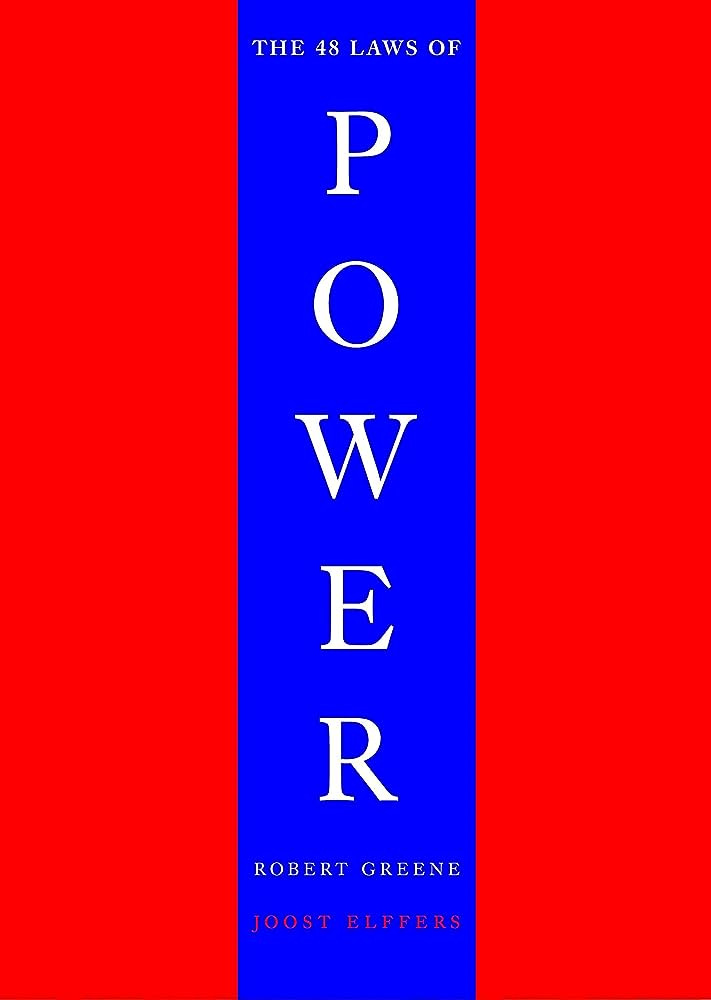My Latest Encounter With The 48 Laws of Power
The 7 Laws That Really Speak To Me
Unsplash Photo Credit: Uriel Soberanes
It’s a Monday and the coffeehouse I frequent is bustling with caffeine addicted enthusiasts. About mid-morning a woman who I had never seen before walked in, making a beeline to the barista who was ringing up orders. It was then when I noticed that she was carrying a book with a vibrant orange and blue cover under her arm.
As you might imagine I became laser directed, not on her stunningly good looks, but trying to decipher the title of the book she was reading. Fortunately, luck was on my side as she meanandered over to sit next to me with her coffee in tow.
Recognizing the book, I said hello and attempted to strike up a conversation. With a look on her face that was indicative of a woman suspicious of a pickup ploy, she redirected the conversation in my direction with a savvy question….
“You’ve read the book? What are your three favorite power laws?”
As you may have guessed by now, she was referring to the perennial bestselling book known as the “The 48 Laws of Power” by Robert Greene. This immensely popular read explores strategies for gaining and maintaining power in various situations through insights into human behavior, historical examples, and practical advice.
Over the years, scores of enthusiasts have found Greene’s strategies immensely valuable in their daily encounters with human nature and the deep complexities underlying it. That being said, opinions on its relevance vary with some arguing it promotes manipulation. Others see it as a guide to understanding the underlying machinations that dictate power in our world. How each person perceives it is largely predicated on their broader world perspective and what they may be seeking to learn from it.
Author Robert Greene is widely known for his books on strategy, power dynamics, and human behavior, all of which I’ve dipped into over the course of my reading journey. “The 48 Laws of Power” along with his other books, which include "Mastery,” "The Art of Seduction," and "The 33 Strategies of War," are all known for their provocative and sometimes controversial content, as they delve into topics like manipulation, influence, and strategy.
What makes him unique among authors is his ability to weave historical anecdotes, psychological insights, and practical advice into his works. Greene's writing style is characterized by its analytical approach to understanding
human nature and the dynamics of power. He has a knack for dissecting intricate interpersonal relationships, often revealing the less obvious motivations behind people's actions.
Personally, I love how his writing polymatically draws from a wide range of sources, including classical literature, philosophy, and biographies. His books represent a fascinating smorgasbord of self-help, history, and social commentary.
Let’s now head back to my encounter with the fellow reader at the coffeehouse. Our conversation was percolating along nicely before her phone rang. She then proceeded with book and coffee in one hand, phone in another to head outside, likely for a more quiet environment to take the call. Her final departing words to me were, “next time we meet let’s discuss those favorite power laws of yours. Have a great day!”
The good news is that I’ll be prepared for when we cross paths again. In the meantime, I thought I’d give you a sneak preview of what I’ll be sharing with her.
The 7 Laws That Really Speak To Me
Law 2: Never put too much trust in friends, learn how to use enemies
With this law, Greene exhorts his readers to be wary of friends stating that they will often betray you more quickly given their tendency towards envy. He says that they also often become spoiled and tyrannical. On the other hand, Greene believes that we should engage our former enemies because they will often prove to be more loyal than a friend, because they have more to prove.
My Observation: This has certainly been true for me, something I frequently wrestle with. But I’ll spare you of the details for now given that some who fall into this friends category may be my very readers.
Law 3: Conceal your intentions
This law explores the benefits of what Greene calls “keeping people off-balance and in the dark by never revealing the purpose behind your actions.” If people have no clarity around what you’re up to, he asserts, they will be unable to prepare a defense. The key here he says is to guide them far enough down the wrong path, engulfing them in smoke and confusion. By the time they realize what you are up to, it will be too late.
My Observation: I’m not going to lie….I actually used this on a landlord who I was renting a room from years ago. He was one bad hombre, so it would have been horrific if I had stayed any longer. By the time he discovered that I had quietly departed in the heat of the night, I was already four weeks into my new place.
Law 16: Use absence to increase respect and honor
Greene says that too much circulation diminishes the value that others see in you. In other words, the more available you are to others, the more common you appear. He says that you can boost your perceived value with others by being hard to get in contact with and scarce.
My Observation: I have a friend in Denver who is notoriously hard to get a hold of. A very, very wealthy friend whose presence is worth a chunk of gold. So on those rare occasions when I do cross paths with him, I bludgeon him with questions knowing it could be months before I see him again.
Law 17: Keep others in suspended terror: Cultivate an air of unpredictability
The main premise of this law is that humans are creatures of habit, with an insatiable desire for familiarity and consistency when it comes to the actions of others. It’s here where your predictability gives them a sense of control. So Greene in this law demonstrates the benefits of being deliberately unpredictable, keeping people off-balance in nonsensical ways that demonstrate a lack of consistency or purpose. What’s fun to watch, he says, is how people will wear themselves out trying to make sense of your moves.
My Observation: People often think that I have a conservative, risk averse, stay out of trouble way about me. Well, in some ways I do. But I am actually more of a shake up the common narrative, swashbuckler type. Case in point — when I recently made a rash move to Vegas many were confused believing that this notoriously crazy city was out of alignment with my preferred lifestyle. Nothing could be further from the truth.
Law 25: Re-create yourself
Greene admonishes his readers to avoid accepting the roles and narratives that society hoists upon you. He says that there may be a certain period in our life where it behooves us to forge a new identity, one that attracts attention through your freshly minted brand presence. “Be the master of your own image,” he says; this opposed to allowing people to externally define you. In doing this Greene asserts that you’ll be able to boost your power and your presence in a way that seems larger than life.
My Observation: In turning 60 in June, I vowed to engage in a massive reinvention of my life in anticipation of my next 60 years. That certainly turned some heads. Watch for it.
Law 35: Master the art of timing
The message here is to never seem in a hurry as Greene says it portrays a lack of control over yourself as well as time. He believes that we can boost our power narrative by always appearing patient, knowing that all of the pieces will eventually fall in place if we avoid messing it up. Greene believes we should step back when the time is not ripe, and strike fiercely when our intended aim has reached fruition.
My Observation: My notorious Taoistic approach to life which embodies “going with the flow and allowing the pieces of life to fall where they may” is often confused and seen by others as aloof and irresponsible. But over the years I have found that if I am in alignment with the natural flow of things, life’s perfect order will often manifest.
Law 46: Never appear too perfect
The book makes the argument through this law that while appearing better than others is always a dangerous proposition, what’s worse is appearing to have no faults or weaknesses at all. In this law, Greene adds that envy has a tendency to create silent enemies. The elixir to this, he says, is to display defects and harmless vices from time to time to appear more human and approachable.
My Observation: Personally, I need to work on this as I often give off the air to others that I have most aspects of my life together. Boy do I have a lot of people fooled.
An Invitation From Diamond-Michael Scott:
“Great Books, Great Minds” is my full-time work and life passion, a labor of love fueled by the endless hours of work I put into researching and writing these feature pieces. So if you enjoy this digital newsletter, find it valuable, and savor world-class book experiences featuring epic authors and book evangelists, then please consider becoming a paid supporting member at $6.00 a month or $60.00/year.






